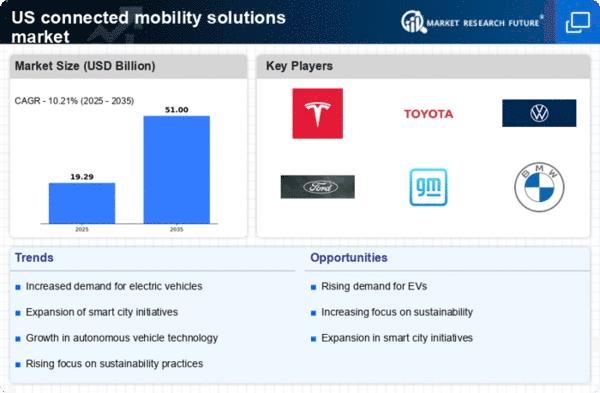Urbanization and Traffic Congestion
Urbanization is a driving force behind the growth of the connected mobility-solutions market. As more people move to urban areas, traffic congestion becomes a pressing issue. The US is witnessing a trend where urban populations are projected to reach 85% by 2030, leading to increased demand for efficient transportation solutions. Connected mobility solutions, such as smart traffic management systems and ride-sharing platforms, are emerging as viable responses to these challenges. By leveraging data analytics and connectivity, these solutions can optimize traffic flow and reduce congestion, thereby enhancing the overall urban mobility experience. This trend is likely to propel market growth as cities seek innovative ways to manage transportation.
Government Initiatives and Regulations
Government initiatives play a crucial role in shaping the connected mobility-solutions market. In the US, federal and state governments are increasingly investing in smart transportation systems and infrastructure. Programs aimed at promoting electric vehicles (EVs) and connected technologies are gaining traction. For instance, the US Department of Transportation has allocated over $1 billion for smart city initiatives, which include connected mobility solutions. These investments are likely to stimulate market growth, as they create a conducive environment for innovation and adoption of new technologies. The regulatory framework is also evolving to support the safe deployment of connected vehicles, further enhancing market prospects.
Technological Advancements in Connectivity
The connected mobility-solutions market is experiencing rapid growth due to advancements in connectivity technologies. Innovations such as 5G networks and vehicle-to-everything (V2X) communication are enhancing the ability of vehicles to interact with their environment. This connectivity allows for real-time data exchange, improving traffic management and safety. In the US, the deployment of 5G is projected to cover 50% of the population by 2025, facilitating the integration of connected mobility solutions. As a result, the market is expected to grow at a CAGR of 20% over the next five years, driven by the demand for seamless connectivity and enhanced user experiences.
Consumer Demand for Enhanced Safety Features
The connected mobility-solutions market is significantly influenced by consumer demand for enhanced safety features in vehicles. As awareness of road safety increases, consumers are seeking vehicles equipped with advanced driver-assistance systems (ADAS) and connectivity features that promote safer driving. In the US, studies indicate that 70% of consumers prioritize safety when purchasing a vehicle, leading manufacturers to integrate connected technologies that provide real-time alerts and assistance. This trend is expected to drive the market, as automakers invest in developing and marketing connected mobility solutions that address safety concerns, potentially increasing market share and consumer trust.
Integration of Electric Vehicles and Charging Infrastructure
The integration of electric vehicles (EVs) into the connected mobility-solutions market is becoming increasingly prominent. With the US government setting ambitious targets for EV adoption, the demand for connected solutions that facilitate charging and energy management is on the rise. The market for EVs is expected to grow by 30% annually, driven by consumer interest and supportive policies. Furthermore, the development of smart charging infrastructure, which allows for real-time monitoring and management of charging stations, is essential for the widespread adoption of EVs. This integration not only supports sustainability goals but also enhances the functionality of connected mobility solutions, making it a key driver in the market.
.png)
















